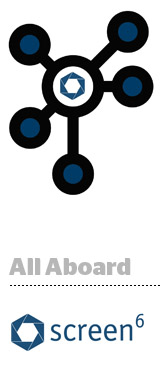
Even vendors need vendors.
On Monday, cross-device provider Screen6 launched an offering called The Hub that Chief Strategy Officer Keith Petri called “a DMP for platforms.”
“The fact is, data management is not as straightforward as our clients or even we have viewed it,” he said.
The ecosystem is choked with data platform players ranging from DMPs for publishers, data onboarders and data aggregators to attribution providers, supply-side platforms and ad servers. Each has its own data set with no straightforward way to create cross-platform collaborations.
The Hub aims to serve as the connection point. It functions as a centralized self-service solution where different platforms can transact with each other and build enhanced cross-device data sets.
Tech vendors onboard their CRM files into The Hub through deterministic data onboarding provider Throtle. Screen6 de-dupes the data and creates a graph of connections based on cross-device user identifiers.
Clients can augment their graphs with data through Screen6’s partnerships with mobile ad network Airpush, mobile attribution company Kochava and social data analytics provider ShareThis and automatically push segments to a demand-side platform for activation.
“The amplification is that much larger and clients can find device IDs that they didn’t previously have access to,” Petri said.
Before onboarding a brand’s data, Throtle thoroughly scrubs the file and chucks anything that would hurt the match rate. As a matter of course, Throtle checks to see that all physical addresses are up to date and that the profiles aren’t dead.
(As in literally dead – deceased. After going through Throtle’s pre-onboarding vetting process, one client, a casual dining restaurant popular with an older demographic, found that 13% of its file – between 13 million and 14 million records – were no longer alive.)
“Our work confirms that the identity graph is accurate and as up to date and scaled as it can possibly be,” said Throtle CEO Paul Chachko. “We’re like the foundation for all of the other capabilities that The Hub offers.”
Beyond targeting and media activation, the solution also includes measurement and analytics capabilities to help partners get an idea of how consumers are moving between devices and the effect of digital media on offline behavior.
Independent programmatic agency Infectious Media is testing The Hub for several clients, including a large mobile cellular network that is assessing the accuracy of its demographic data, most of which is tied to mobile ad IDs, and extending that data set to desktop.
“We know their data is very good, but mobile app is limiting right now because it’s still not a big part of spend yet,” said Infectious Media CTO Dan De Sybel. “So, they’re giving the data and the device IDs to us, and we’re giving them the cookies the IDs are related to. The idea is to use Screen6’s matching technology to effectively extend other third-party data sets.”
Infectious is also using The Hub for another client that’s trying to get a sense of its cross-device customer journey to prove the hypothesis that its users are researching on mobile even if they ultimately convert online.
Without being able to see how consumers move across devices, “a mobile campaign might look like it’s performing badly even if it isn’t because there’s no understanding that people are only moving to desktop for the actual transaction.”
Beyond CRM data onboarding and audience amplification, The Hub enables clients to layer location data into their personal graphs and create audiences from that information. It also helps clients expand a campaign by identifying all of the devices within a particular household.
Although it’s difficult to quantify how much more scale vendors are getting out of their data sets on average by joining forces because each graph is different, Petri said clients are seeing an improvement in their match rates.
Think of The Hub as almost like a dating service for tech companies with siloed data sets, he said. The data is better together.
“The benefit here overall is to make [clients] see all of the missed opportunities they weren’t previously aware of,” he said. “Now those opportunities are very much visible to them.”
This post was syndicated from Ad Exchanger.

More Stories
Streaming Ratings, Week of March 24: Shonda Rhimes’ The Residence Reaches First Place
CPGs Talk Tariffs, Price Hikes, and Marketing Budgets as Consumer Confidence Drops
Ticker: Chris Cuomo to Moderate NewsNation Town Hall Marking Trump’s 1st 100 Days